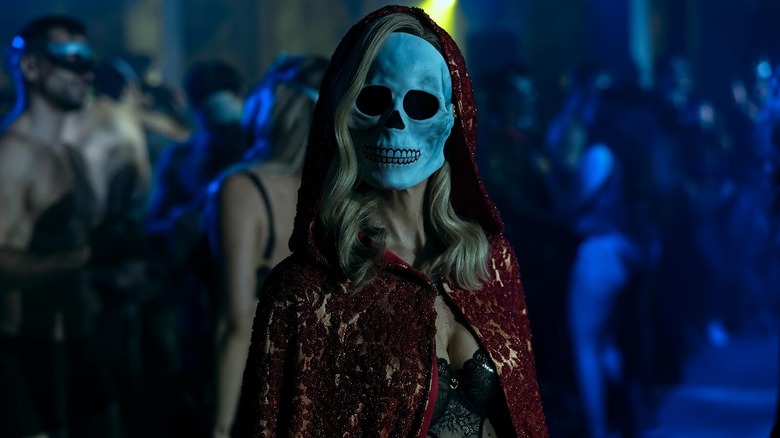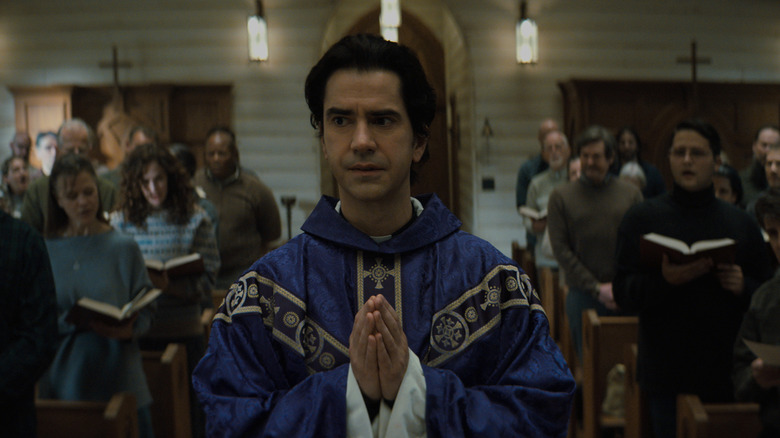Stephen King Called The Creator Of This Netflix Series 'The Quentin Tarantino Of Horror'
Stephen King has authored several must-read horror novels, many of which have been turned into successful film and TV adaptations. From "The Shining" to "IT" to "'Salem's Lot," the writer has more than proven himself as a true genre master, so whenever he recommends something spooky, horror fans take it seriously. With that in mind, King has showered praise on Mike Flanagan's Edgar Allan Poe series, "The Fall of the House of Usher," on Netflix — and he even compared its creator to filmmaker Quentin Tarantino. As he wrote on X (formerly known as Twitter):
"THE FALL OF THE HOUSE OF USHER (Netflix): I missed this when it bowed due to hip surgery, but this is a case of delayed gratification. Scary, involving, with writing that's witty and moves the plot. There's a case to be made for Mike Flanagan being the Quentin Tarantino of horror."
King didn't explain the reason for comparing Flanagan to Tarantino, but it might have something to do with the fact both artists boast distinct creative voices and like to deconstruct and revise the genres they operate in. While Tarantino has made crime, war, horror, action, and Western movies, his work is almost a genre unto itself — so much so that it's even inspired a sub-genre of Tarantino-esque movies like "Two Days in the Valley" and "Things to do in Denver When You're Dead."
Similarly, while Flanagan predominantly makes horror movies and TV shows, he isn't loyal to the genre's regular formulas. "The Fall of the House of Usher" is a prime example of his originality, as the series modernizes the stories of Poe and applies them to a satirical family drama in the vein of "Succession." Perhaps this is why he has found a big fan in King, who has also praised Flanagan's adaptations of his own stories.
Stephen King is a long-time fan of Mike Flanagan's brand of horror
As of this writing, Mike Flanagan has brought three Stephen King stories to the screen — "Gerald's Game," "Doctor Sleep," and "The Life of Chuck" — and earned heaps of critical praise for each of these adaptations. What's more, he is currently working on a "Carrie" miniseries and doing his best to adapt "The Dark Tower" into a TV show, suggesting that he is more than happy to spend his creative energies on King-inspired projects for years to come.
This will also come as good news to King, who has routinely praised Flanagan's projects, not least of all the ones based on his own work. In fact, he was passionately supportive of Flanagan's "The Haunting of Hill House" series, based on Shirley Jackson's beloved chiller of the same name, as he revealed in a post shared to X/Twitter in 2018:
"THE HAUNTING OF HILL HOUSE, revised and remodeled by Mike Flanagan. I don't usually care for this kind of revisionism, but this is great. Close to a work of genius, really. I think Shirley Jackson would approve, but who knows for sure."
Of course, Flanagan's unconventional approach to storytelling can also be attributed to the influence of King's stories on his style. The filmmaker is a lifelong fan of the author, and he is driven by his tales of terror, seeing as they are about more than jump scares and bloodletting.
Mike Flanagan's style is inspired by Stephen King
Stephen King's influence on Mike Flanagan goes beyond adapting his work, as some of the television and film creator's original ideas are love letters to the author's style, sensibilities, and themes. For example, Flanagan's "Midnight Mass" could easily be mistaken for one of KIng's creations if you didn't know any better. The Netflix miniseries tells the story of a priest who brings miracles to a small town, but terror lurks in the shadows. It also echoes King tales like "'Salem's Lot" and "Storm of the Century," which center around rural communities encountering supernatural horror threats.
Like King's stories, Flanagan's movies and series are fascinated with human drama, and the supernatural elements are merely there to facilitate their characters' transformative journeys. Flanagan believes King's stories are about more than horror, and that is why he gravitates toward them, as he once explained in an interview with Suntup Editions:
"His attention to character development, to humanity, and to narrative structure are some of his most defining traits, and those are very difficult to translate into a medium that tends to jettison those kinds of nuances in favor of shock, blood, and scares ... [A]t the heart of his work is a conversation about the human condition, about flawed people in extraordinary situations, and about the darker corners of our nature."
While there might be a case to be made that Mike Flanagan is the Quentin Tarantino of horror, he is arguably the genre's natural successor to King, albeit in a different medium. Regardless of who he is comparable to, however, many horror fans agree that Flanagan is the real deal.


